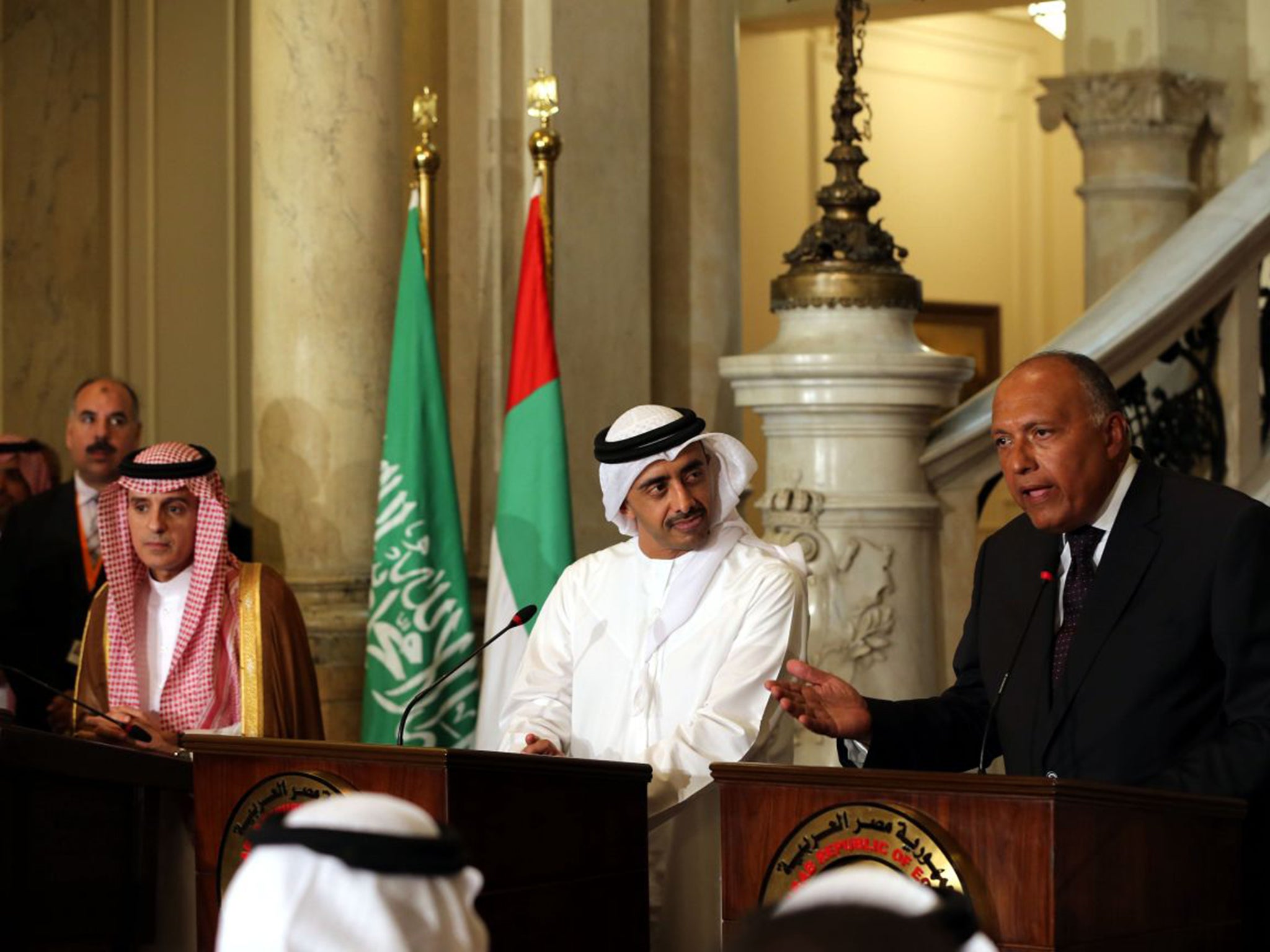Gulf states blast 'negative' response from Qatar to demands as diplomatic crisis deepens
Doha has described the list of demands as so far-reaching it appears intended to be rejected

The foreign ministers of Saudi Arabia, the UAE, Bahrain and Egypt have criticised the "negative" response from Qatar to their list of demands, prolonging the month-long standoff.
The four countries cut ties with Qatar over its close ties to Iran and alleged support for terrorist groups, something Doha denies. The deepening rift has caused concern for Western allies that see the region's leaders as key partners in both energy and defence. The fact that the group have not imposed further sanctions will come as some relief.
Representatives of Saudi Arabia, the UAE, Bahrain and Egypt met in Cairo on Wednesday after Qatar responded to a far-reaching list of 13 demands which the bloc insisted must be met to end the tiny energy-rich kingdom’s isolation. Those demands include shutting down the pan-Arab Al Jazeera TV channel, curtailing Qatar's support for the Muslim Brotherhood, closing down a Turkish military base – something Turkey is against – and downgrading its ties with Iran.
"The response the four states got was overall negative and lacked any content. We find it did not provide a basis for Qatar to retreat from its policies,” Egyptian Foreign Minister Sameh Shoukry said, reading out a joint statement following the meeting.
Mr Shoukry said that the four Arab states "hope wisdom prevails and Qatar makes the right decision".
Saudi Foreign Minister Adel al-Jubeir said: “The political and economic boycott will continue until Qatar changes its policies for the better.” He added that any further steps taken against Qatar would be "taken at the appropriate time" and claimed they would be "in line with international law."
After a two-day extension to an initial 10-day deadline, Doha had submitted its response to what it considered “legitimate” demands from its neighbours early on Wednesday via Kuwait, which is acting as a mediator.

Tentative reconciliation efforts led by Kuwaiti delegations, as well as encouragement from Turkey, Germany, the US State Department and UN, have so far come to nothing. With all sides so far refusing to back down, it is feared a compromise could still be elusive.
In a sign of the importance of the matter to the US, President Donald Trump spoke to Egyptian President Abdel Fattah al-Sisi on Wednesday, calling on “all parties to negotiate constructively to resolve the dispute” with Qatar and to “stop terrorist financing and discredit extremist ideology”.
The four Arab nations – followed by a handful of other Muslim countries – abruptly cut off ties on 5 June – accusing Qatar of meddling in their internal affairs, in addition to the terror funding accusations.
The move plunged the country into crisis, sending the stock market tumbling and effectively closing down its airspace.
Families have been split up and myriad businesses affected by demands for Qatari nationals to leave the countries involved, and vice versa.
On Tuesday, credit ratings agency Moody’s downgraded Qatar’s economic outlook to negative as the diplomatic dispute continued to have economic effects.
“The likelihood of a prolonged period of uncertainty extending into 2018 has increased and a quick resolution of the dispute is unlikely over the next few months,” a statement read.
Qatar has strongly denied all the allegations against it, and reacted with anger to its neighbours’ 13-point demands list, which included points such as closing down state-owned Al Jazeera, paying restitutions and cutting off alleged links to Isis, Iran and the Muslim Brotherhood.
The Doha government had previously described the list as so far-reaching it appears intended to be rejected, adding that it was an “affront” to Qatar’s sovereignty. Nonetheless, it agreed to consider some demands.

Qatar’s official response has not yet been made public.
While some Arab media outlets have suggested a military confrontation or a change of leadership in Qatar could be in the offing, officials have said those options are not on the table.
Although further sanctions have been threatened if Doha does not capitulate, last week the UAE's foreign minister Anwar Gargash played down the chances of an escalation, saying “the alternative is not escalation but parting ways”. The comment was interpreted by many as suggesting Qatar may be forced out of the Gulf Cooperative Council (GCC), the regional political body which serves as a counterbalance to Iran.
News agencies contributed to this report
Join our commenting forum
Join thought-provoking conversations, follow other Independent readers and see their replies
Comments
Bookmark popover
Removed from bookmarks